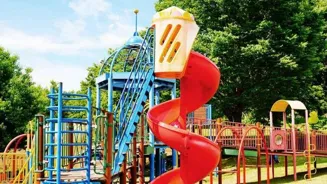Unleash the Power of Play: Transform Your Life with 5 Key Benefits for All Ages. Dive in to discover the magic of play!
In the hustle-bustle of modern life, where studies and deadlines seem to rule our
days, it's easy to forget something truly essential: play. Play isn't just for kids; it's a vital ingredient for a happy, healthy, and well-balanced life at any age.
From building stronger connections to boosting creativity and reducing stress, incorporating play into your daily routine can transform your overall well-being. Let's dive into five fantastic benefits of embracing play, for both the young and the young at heart.
Play Enhances Creativity and Problem-Solving Skills
Play is a breeding ground for innovation. When we engage in playful activities, whether it's building with LEGOs, solving puzzles, or simply daydreaming, we're essentially exercising our brains in ways that stimulate creative thought.
For children, play helps them explore different scenarios, test ideas, and develop their imaginations. They learn to think outside the box, experiment with new approaches, and find unique solutions to problems.
The open-ended nature of play allows them to take risks and learn from their mistakes without fear of judgment. It nurtures their curiosity and encourages them to think flexibly.
Adults, too, can greatly benefit from this creative boost.
Engaging in playful activities can help us break free from rigid thinking patterns and generate new ideas in our work and personal lives. Imagine brainstorming sessions fueled by playful exercises or team-building activities that encourage collaboration and imaginative thinking.
By incorporating play into our daily routines, we can tap into our inner child and unlock a fresh perspective on the challenges we face. Play allows us to approach problems with a sense of fun and curiosity, leading to more innovative and effective solutions.
Play Reduces Stress and Improves Mental Well-being
Stress has become a major problem in today's world, affecting people of all ages. Play offers a powerful counter measure. When children are stressed about school , playing enables them to forget their worries.

When adults engage in fun activities, their brains release endorphins, natural mood boosters that reduce pain and stress . Play helps us to relax, unwind, and take a break from the pressures of daily life. It's an outlet for releasing pent-up emotions and finding joy in the present moment.
Moreover, play helps build emotional resilience. Through playful interactions, children learn to navigate social situations, manage conflicts, and develop empathy. They learn to understand and respond to the emotions of others, building stronger relationships and increased social intelligence.
Adults, too, can benefit from the emotional regulation aspects of play. Engaging in activities we enjoy can help us cope with stress, regulate our emotions, and maintain a positive outlook on life.
Making time for play can be a simple yet effective way to nurture our mental health and increase our overall sense of well-being.
Play Strengthens Relationships and Builds Social Skills
Play often involves interacting with others, whether it's playing board games with family, joining a sports team, or simply chatting and laughing with friends. These interactions provide valuable opportunities to develop social skills, improve communication, and build stronger relationships.
Children learn to share, take turns, cooperate, and negotiate while playing with others. They develop their ability to understand and respond to social cues, building empathy and social awareness. Playing team sports or group games teaches teamwork, communication, and collaboration.
For adults, play provides a chance to connect with loved ones in meaningful ways. Shared laughter and fun experiences create lasting memories and strengthen emotional bonds. Engaging in playful activities with friends and family can help us overcome barriers, build trust, and improve communication.
Whether it's a game of cricket , participating in a community event, or organizing a karaoke night with friends, play provides a platform where we can be ourselves, have fun, and connect with others.
Strong social connections are essential for overall well-being, and play is a powerful tool for building and nurturing lasting relationships.
Play Improves Physical Health and Fitness
While we often associate play with mental and social benefits, it also has significant positive impacts on our physical health. Active play, such as running, jumping, dancing, and sports, can help improve cardiovascular health, build strength and endurance, and maintain a healthy weight.
For children, active play is essential for their physical development, promoting bone and muscle growth, improving coordination, and preventing childhood obesity. Playing ensures that the kids go away for a while from screen.
Even for adults, incorporating more play into our lives can have a huge impact on our physical fitness. Instead of hitting the gym for a monotonous workout, consider playing a sport you enjoy, dancing to your favorite music, or going for a hike in nature.
These activities not only provide physical exercise but also make fitness fun and enjoyable. Engaging in playful activities can help us stay active, reduce the risk of chronic diseases, and improve our overall physical well-being.
So, ditch the sedentary lifestyle and embrace the joy of play to improve your physical fitness and health.
Play Encourages Learning and Cognitive Development
Play is not just about fun and games; it's also a powerful tool for learning and cognitive development. Through play, children explore the world around them, learn new concepts, and develop problem-solving skills.
Educational games, puzzles, and building blocks stimulate their minds, enhance their memory, and improve their attention span. Children learn best when they are actively engaged and having fun, and play provides the perfect environment for this type of learning.
Games like chess do a lot for the cognitive development of kids. Taking regular classes of music also help in cognitive development.
For adults, play can also be a valuable way to learn new skills and keep our minds sharp.
Engaging in mentally stimulating games, puzzles, and hobbies can help improve memory, focus, and cognitive flexibility. Learning a new language, playing a musical instrument, or taking up a skill such as coding can be challenging but also incredibly rewarding.
Playful learning keeps our minds engaged, improves our problem-solving abilities, and helps us stay mentally fit throughout our lives.
















